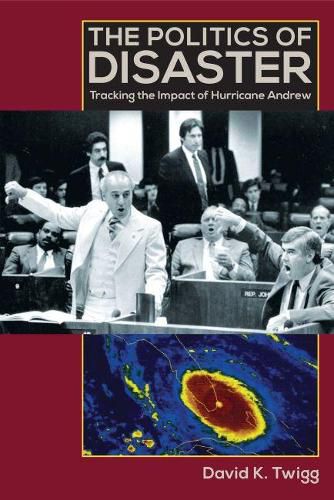Readings Newsletter
Become a Readings Member to make your shopping experience even easier.
Sign in or sign up for free!
You’re not far away from qualifying for FREE standard shipping within Australia
You’ve qualified for FREE standard shipping within Australia
The cart is loading…






This title is printed to order. This book may have been self-published. If so, we cannot guarantee the quality of the content. In the main most books will have gone through the editing process however some may not. We therefore suggest that you be aware of this before ordering this book. If in doubt check either the author or publisher’s details as we are unable to accept any returns unless they are faulty. Please contact us if you have any questions.
From earthquakes to tornados, elected officials’ responses to natural disasters can leave an indelible mark on their political careers. In the midst of the 1992 primary season, Hurricane Andrew overwhelmed South Florida, requiring local, state, and federal emergency responses. The work of many politicians in the storm’s immediate aftermath led to a curious incumbency advantage in the general election a few weeks later, raising the question of just how much the disaster provided opportunities to effectively campaign without campaigning.
David Twigg uses newspaper stories, scholarly articles, and first person interviews to explore the impact of Hurricane Andrew on local and state political incumbents, revealing how elected officials adjusted their strategies and activities in the wake of the disaster. Not only did Andrew give them a legitimate and necessary opportunity to enhance their constituency service and associate themselves with the flow of external assistance, but it also allowed them to achieve significant personal visibility and media coverage while appearing to be non-political or above normal politics.
This engrossing case study clearly demonstrates why natural disasters often privilege incumbents. Twigg not only sifts through the post-Andrew election results in Florida, but he also points out the possible effects of other past (and future) disaster events on political campaigns in this fascinating and prescient book.
$9.00 standard shipping within Australia
FREE standard shipping within Australia for orders over $100.00
Express & International shipping calculated at checkout
This title is printed to order. This book may have been self-published. If so, we cannot guarantee the quality of the content. In the main most books will have gone through the editing process however some may not. We therefore suggest that you be aware of this before ordering this book. If in doubt check either the author or publisher’s details as we are unable to accept any returns unless they are faulty. Please contact us if you have any questions.
From earthquakes to tornados, elected officials’ responses to natural disasters can leave an indelible mark on their political careers. In the midst of the 1992 primary season, Hurricane Andrew overwhelmed South Florida, requiring local, state, and federal emergency responses. The work of many politicians in the storm’s immediate aftermath led to a curious incumbency advantage in the general election a few weeks later, raising the question of just how much the disaster provided opportunities to effectively campaign without campaigning.
David Twigg uses newspaper stories, scholarly articles, and first person interviews to explore the impact of Hurricane Andrew on local and state political incumbents, revealing how elected officials adjusted their strategies and activities in the wake of the disaster. Not only did Andrew give them a legitimate and necessary opportunity to enhance their constituency service and associate themselves with the flow of external assistance, but it also allowed them to achieve significant personal visibility and media coverage while appearing to be non-political or above normal politics.
This engrossing case study clearly demonstrates why natural disasters often privilege incumbents. Twigg not only sifts through the post-Andrew election results in Florida, but he also points out the possible effects of other past (and future) disaster events on political campaigns in this fascinating and prescient book.